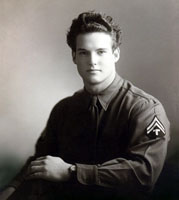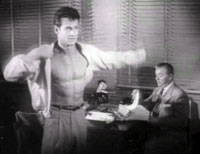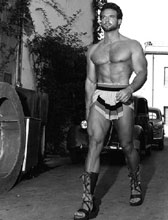![]()
2121 San Fernando Road Suite 3
Los Angeles, CA 90065
Tel 323.223.6867 drkrm@mac.com hours:
Tue-Sat 11-5 Sun 1-4
An
Interview with Steeve Reeves from The Perfect Vision Magazine
Volume 6 Issue #22 July 1994
Used with the kind permission
of the editor Roy Frumkes
Long ago, the back pages of magazines featured body-building
advertisements by Charles Atlas and Joe Bonomo. Today, the body beautiful
has become mega-box office, led by Arnold Schwarzenegger and Sylvester
Stallone. In between those eras, in the late 1950s, there was a turning
point, where the sport of body-building suddenly became mainstream, because
one of its practitioners had achieved stardom. Steve Reeves seemed to
lead as Spartan an existence as one would assume a man devoted to physical
fitness might. There were never any tabloid scandals, so instead there
were rumors: He was 5' 7", and the producers of his films had to
hire actors two inches shorter than him to make him look larger (untrue);
sets had to be scaled down to further pump up his stature (wrong again);
his voice was dubbed, therefore he had a high voice, or a Brooklyn accent,
or no voice at all due to steroid use (all false). As suddenly as his
film career began, it ended in the late Sixties, and Reeves retired into
the relative obscurity of private life. Having served for 15 years as
a role model to millions--of physical perfection, and of living proof
that self-made stardom was possible-it was fervently hoped that his disappearance
from public activity was self-imposed, and that wherever he was, he was
both happy and financially secure.
TPV: If I grew up on your films, whose films did you grow up on? There
was literally no precedent for your appearance in film.
Steve Reeves: I grew up on Johnny Weissmuller.
TPV: What did you think of Victor Mature in Samson and Delilah?
SR: Did you know that I was under contract to do that picture?
TPV: No.
SR: Well, here it is. In 1947, when I won the Mr. America title in Chicago,
I got back to my hotel and there was a letter from an agent in New York
City. It said “If you're interested in show business, I think you
have potential. Give me a call or write me a letter and I'll see that
you go to acting school on the GI Bill of Rights. We'll find you a little
apartment, and on weekends we'll get you into vaudeville acts so you can
make some extra money.”

I
had gotten out of the army six months before and was attending California
Chiropractic College in San Francisco. Chiropractic was my major, and
my minor was physical therapy and massage. When I got that offer, I said,
why not? I went back to New York and went to Marlon Brando's coach, Stella
Adler. I was in her class and one day she gave me the project of acting
pigeon-toed. I was walking around like she wanted me to, and she said,
'You're not doing it right.' I stopped and said, 'From the age of six
to the age of ten I had to force myself not to be pigeon-toed. So don't
tell me I'm not doing it right. Most of the people in this class want
to be character actors. They like to walk pigeon-toed, stutter, and lisp.
But I want to be a leading man. I want to learn how to walk well and speak
well.' She said, 'Would you see me after class, please?' So I went after
class and she said, 'You know, you're disrupting the class. I think I'll
have to give you your money back.' I said, 'Yes, I think you'll have to.'
Then I enrolled in the Theodora Irvin School of the Theater, which wasn't
all theory and gave us little plays to perform. And during the time I
was there, I was doing a vaudeville act with a comedian named Dick Burney.
We would go to all the different circuits on weekends. One of Cecil B.
De Mille's talent scouts saw me and brought me into Paramount, New York
City, for a screen test for Samson and Delilah. I did the test
in my street clothes but I passed it, and he sent me a seven year contract.
So, on my 22nd birthday, I left New York City on a plane to Hollywood
and got myself a little apartment within walking distance of Paramount
Studios, because I didn't have a car.
I arrived at Paramount and walked into Mr. De Mille's office. He had five
two-foot by three-foot blow-ups of pictures on his wall. The pictures
were of Bob Hope, Bing Crosby, Dorothy Lamour, Alan Ladd, and me, in a
pose called "Perfection in the Clouds," where I'm standing with
my hands over my head stretching toward the sky.

And he said, 'This is my Samson.' Then he added, 'But you must realize
that the motion picture camera puts on 15 pounds, so you're going to have
to lose 15 pounds. You understand?' I said, 'Yes, sir.' He gave me a coach
who would spend a couple of hours a day with me, and he'd invite me to
have lunch with him every day. All the starlets on the lot came up to
me and said, 'Why don't you take me to lunch today?' I couldn't figure
out why they were so interested in me. I thought, I'm a pretty good-looking
guy and all, but not this much. I found out later the main reason was
that they wanted to have lunch with Mr. De Mille, because they'd, been
there for years and never even met the man.So I'd lose five pounds, then
I'd go out to the beach on Sunday and all my friends would say, 'Steve,
you're looking terrible. You're ruining yourself. You're the world s greatest;
what do you want to be just another actor for? Why don't you stay in this
field.’ Then I'd go back to the studio and De Mille would say, 'Look,
you've only lost five pounds, and I've got to start the picture about
three or four months from now.'Once a week I would have to do a skit for
him. I would study it, and they'd give me other actors to work with. I
was on a stage where they had a glass window between the seats and me,
and I couldn't see him. I did this on and off, I guess, for about three
months. Then he called me into his office and said, 'You've lost seven
pounds in three months. Some days your skits are really good; and some
days they're terrible. It looks like you're preoccupied with something.
I'm going to start the picture a month from now, and I'm going to have
to use Victor Mature. He's not ideal for it, but he's an experienced actor,
and I can depend on him.'
TPV:
What did you think of the final product?
SR: Nothing against Victor Mature, but I learned that a person has to
have the sympathy of the public. In Samson and Delilah, in the
scene where they blinded him, there were little 'oohs' and 'ahs,' but
within six months I saw Captain From Castille with Tyrone Power,
where he gets wounded on the side of his head, and all the women in the
audience went 'Ohhhh!' Tyrone Power had the sympathy of the audience and
Victor Mature didn't - at least in that picture.
TPV: After that you toured with Mae West?
SR: I never toured with Mae West. That's a fallacy that's always reported
about me. During the time the 'Mae West Show' was on, I was playing in
Kismet on Broadway.
TPV: Were you in Ed Wood's Jail Bait?
SR: Yes. The picture was originally called The Hidden Face. It's
about a criminal who goes to a plastic surgeon who changes the criminal’s
face to resemble his own. Somewhere in the film there was something about
'jail bait,' so they decided the title Jail Bait was more commercial.
It was my first film, and I got my Screen Actors Guild card for it.
TPV: Are you aware that Hollywood is doing an $18 million dollar film
about Ed Wood, directed by Tim Burton?

SR: I didn't know about that, but I know he has a big following. I was
contacted about two years ago and asked to write a letter about my impressions
of him on the set. Wood was a very cooperative guy who let you do things
the way you wanted to, and if they weren't quite right he would direct
you. But he wasn't the kind of director who was always on you. The shoot
lasted two or three weeks for me, off and on. I played a young detective,
and I had a suit on at all times. I even had a tie. Only took my shirt
off once. Those were the days, huh?
TPV: What brought you to Italy for the Hercules films?
SR: Pietro Francisci, the director of Hercules. He wrote the
script also, and he had I been looking for Hercules for about five years.
Around' Italy, he'd find somebody who was good looking and tall, but had
no body. Or someone who was good looking but short, and had a great body.
He just couldn't find the right combination. One day his daughter, who
was 13, went to the theater and saw Athena [MGM, 1954, starring
Jane Powell, in which Reeves appeared], which had gotten to Italy by then.
And she ran home and said, 'Daddy, I think I have your Hercules.' He went
to the theater the next day, pictured me with a goatee and moustache,
and felt I would be his man. At the time I was working for American Health
Studios in public relations. I'd go to Riverside and open up a fitness
studio with the mayor and Miss Riverside, then wait another two weeks
or so and open another one someplace else. I had a good job with them,
it didn't use too much of my time, and the owner made me promise I'd forget
about show business if I worked with him. So when the Hercules offer came,
I just ignored it. Then Francisci wrote me another letter and said 'Look,
this is serious. Here's an airplane ticket.' There was also an advance
of $5000, which in those days was quite an advance. I realized the guy
was serious. I started growing a moustache and goatee on my job. This
way I didn't have to have something glued on, which is terrible. My boss
asked me what I was doing it for, and I said I wanted to look more distinguished.
I was only paid $10,000 for Hercules and I had no percentage. The film
cost a half million to make, and it earned $40 million in the United States
alone. It was the box office champion of 1959. I outgrossed John Wayne,
Rock Hudson, and Doris Day, who were the big money makers at the time.
And I was the biggest box office star, not only in the United States,
but around the world.
TPV: Considering that, what kept you from going to Hollywood? I'm surprised
they didn't grab you.
SR: Hercules was made in the summer and fall of '57. It didn't get to
the States until the summer of '59, and by the time it opened here I'd
already made four other films, and had committed myself to others. I did
Hercules Unchained for the same salary as Hercules,
but with every picture from then on I doubled my salary from the previous
one.
TPV: You made 16 films. I guess I could do the math.
SR: At the end I was making $250,000 a film, which was good in those days.
Sophia Loren and I were the highest paid actors in Europe.
TPV: What was the shooting schedule on Hercules?
SR: Three months. Most of my pictures were about three months. In the
case of Hercules, the picture was over, but my contract said I had to
stay around in case they needed some retakes. I waited about three days,
then shaved off my beard. Then they called me and said they would need
a day of retakes. But they added, 'We don't have any money. You have to
do it for nothing.' I went and talked to Francisci, and he said, 'If you're
my friend, you'll do it for nothing.' And I said, 'If you're my friend,
you wouldn't ask me to do it for nothing.' Eventually, they agreed to
pay me. 'We'll have the money there when you get on the set.' I went there
and got my goatee and mustache pasted on, got into my costume, ready to
shoot, and the money didn't show up. So I sat down in a yoga position,
pretending to put myself in a trance. I played the part of a god, and
the clouds actually started coming in so that they couldn't shoot. So
they said, 'We'll have the money here by noon,' and sure enough, they
arrived with half the money at about 12 o'clock, and the clouds parted
and we did half a day's shooting. The next day they came on the set with
the rest of the money and that was it.'

TPV: Did you have to work out a few hours a day on the set?
SR: No. That's an amazing thing. My body responds so well to exercise,
and it keeps it so long, that I didn't have to. I didn't take any steroids,
they didn't exist at that time. It was just easy for me to get in shape
and to stay in shape. During the 15 years I was in Europe, I would work
out possibly one month a year, usually the month of May. I lived in Switzerland
most of the time and I would go skiing and take walks with my dog. But
the food there was so great that I would gain maybe 10 pounds during the
winter. So during May I'd work like son-of-a-gun. Run through the mountains
there, use the weights, and get in top form that month, and that would
last me through the season. During filming you're too exhausted I get
a decent workout, and I really didn't need because the stress that there
is in acting kept the fat off me and the muscle didn't want to go away.
TPV: Did you really hoist Primo Carne over your head in Hercules Unchained?
SR: Yes. He was a big old guy, a real great guy. He didn't always know
his own strength but that's okay. There was no competition or friction
between us. He was very helpful. He said, 'When you have to lift me up,
the best way to do it is this way and this way to get leverage. And that'll
make you look better.’ Very nice guy.
TPV: Did you do your own dubbing for the Italian films?
SR: No. In Jail Bait and Athena I used my own voice,
and I'm using my own voice now. But in Italy they had actors who would
speak different languages and different dialects in the same scene. And
also, if an airplane flew over, it wouldn't bother them, whereas here
in the States they say 'Silence.' They say it there, too, but it doesn't
happen. At the end of the film, they mail the script and the film to New
York City and hire radio actors to dub it. I remember one scene in The
White Warrior in Yugoslavia, where I believe there were seven of
us sitting around a campfire. I was speaking English, the person next
to me was speaking Spanish, the person on the other side of me was speaking
Italian, another person was speaking Yugoslav, another was speaking Serb,
an another was speaking some other language. And you know, a lot of acting
is reacting to the other person, being attentive to what they're saying.
Well, I was the most attentive actor you've ever seen. I knew that when
the guy would grunt or stomp his foot on the ground, it was my cue to
come in. I knew what they were saying, but I didn't know when they were
going to end.
TPV: Were there foreign cuts of your films? So many European films, particularly
the horor films, had more violence and nudity in the foreign cuts.
SR: No, mine were always filmed the way they were going to be in all markets.
There was no more violence or nudity than what you saw.